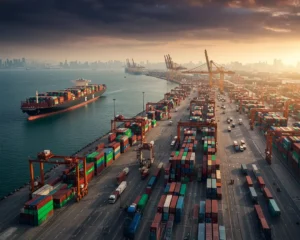Air & Ocean Freight Services Explained
- ULS Freight

In today’s fast-paced global economy, businesses rely on smooth and reliable freight solutions to move goods across borders. Whether you’re shipping electronics from Asia, pharmaceuticals across North America, or raw materials for production, choosing the right freight service is crucial. Two of the most widely used options are air freight services and ocean freight services, each with its strengths, costs, and considerations.
At ULS Freight, we specialize in delivering flexible, end-to-end logistics solutions that fit your cargo, timeline, and budget. By understanding how air and sea freight work, you can make smarter shipping decisions that keep your supply chain moving without unnecessary delays or costs.
What is Air Freight?
Air freight refers to transporting goods via airplanes, either through cargo planes or dedicated sections of passenger flights. It’s the go-to choice when speed matters most. For industries such as medical supplies, fashion, or high-value electronics, air freight express service ensures products reach their destination in days rather than weeks.
Key benefits of air freight include:
- Speed: The fastest mode of international shipping.
- Security: Cargo is handled with strict airport protocols.
- Reliability: Scheduled flights keep transit times consistent.
However, air freight typically comes with higher costs, making it ideal for urgent, high-value, or lightweight shipments.
What is Ocean Freight?
Ocean freight, also known as sea freight services, involves transporting goods by ship across international waters. It’s the most widely used shipping method for bulk goods, raw materials, and large-scale commercial products.
Why businesses choose ocean freight:
- Cost-Effective: Much cheaper than air freight for large volumes.
- Capacity: Ships can carry oversized and heavy cargo without limitations.
- Global Reach: Supports international trade at scale.
That said, ocean freight takes longer—often weeks instead of days—so it’s best suited for cargo where speed is less critical but cost efficiency is a priority.
Air Freight vs. Ocean Freight: Choosing the Right Option
When deciding between air freight services and ocean freight services, companies must weigh speed, cost, cargo type, and environmental impact.
- Time-Sensitive Shipments → Choose air freight express service.
- Heavy or Bulk Cargo → Opt for sea freight services.
- Budget Constraints → Ocean freight is significantly more affordable.
- Environmental Considerations → Ocean shipping generally leaves a smaller carbon footprint per ton of goods.
ULS Freight helps clients evaluate these trade-offs and tailor solutions based on shipment requirements.

Common Questions About Freight
How to Pronounce Freight
“Freight” is pronounced as frayt (rhymes with “great”).
What is Freight Cost?
Freight cost is the total expense of transporting goods from origin to destination. It includes base shipping rates, fuel surcharges, handling fees, customs duties, and sometimes insurance. Air freight costs more per kilogram than ocean freight, but ocean freight can include additional port and container handling charges.
What is Freight Class?
In the U.S., freight class is a system used to categorize shipments for pricing in less-than-truckload (LTL) shipping. It considers density, handling, liability, and stowability. While this mainly applies to domestic trucking, understanding freight class helps shippers align costs with the type of cargo.
What is Freight Shipping?
Freight shipping is the movement of goods in bulk by air, sea, road, or rail. It differs from small parcel shipping because it typically involves larger quantities, special handling, and logistical coordination across different transport modes.
What Does CWT Mean in Freight?
CWT stands for “hundredweight”, a unit used in freight pricing. In the U.S., 1 CWT = 100 pounds. Carriers often use CWT to calculate shipping costs for heavy goods, ensuring consistent billing across shipments.
Why Choose ULS Freight for Air & Ocean Services?
ULS Freight goes beyond just moving cargo—we build reliable logistics strategies that keep your supply chain competitive. Our team offers:
- Global Air Freight Express Service: Fast, secure transport for high-value and time-sensitive shipments.
- Efficient Ocean Freight Services: Cost-effective shipping solutions for large-scale or bulk cargo.
- Custom Logistics Planning: Tailored routes, documentation support, and real-time tracking.
- Cross-Border Expertise: Seamless compliance and customs clearance for international freight.
Whether you need urgent delivery via air or affordable large-scale transport via sea, ULS Freight ensures your business stays ahead in today’s global market.
Conclusion
Understanding the differences between air freight services and ocean freight services helps businesses balance speed, cost, and efficiency. While air freight express service delivers unmatched speed, sea freight services provide unmatched affordability and scalability.
At ULS Freight, we empower businesses with the right freight solution for every shipment, keeping your goods moving, your customers satisfied, and your supply chain resilient.
Contact ULS Freight today to discuss the best air and sea freight options for your business.
About ULS Freight
We are Road freight forwarder based in Canada, and offering our road freight services all across the USA, Canada, and Mexico for the last 10 years.
Recent Posts

The Global Supply Chain Crisis: How Logistics Companies Are Responding

Cross-Border Freight Challenges: Navigating Compliance in a Global Market

